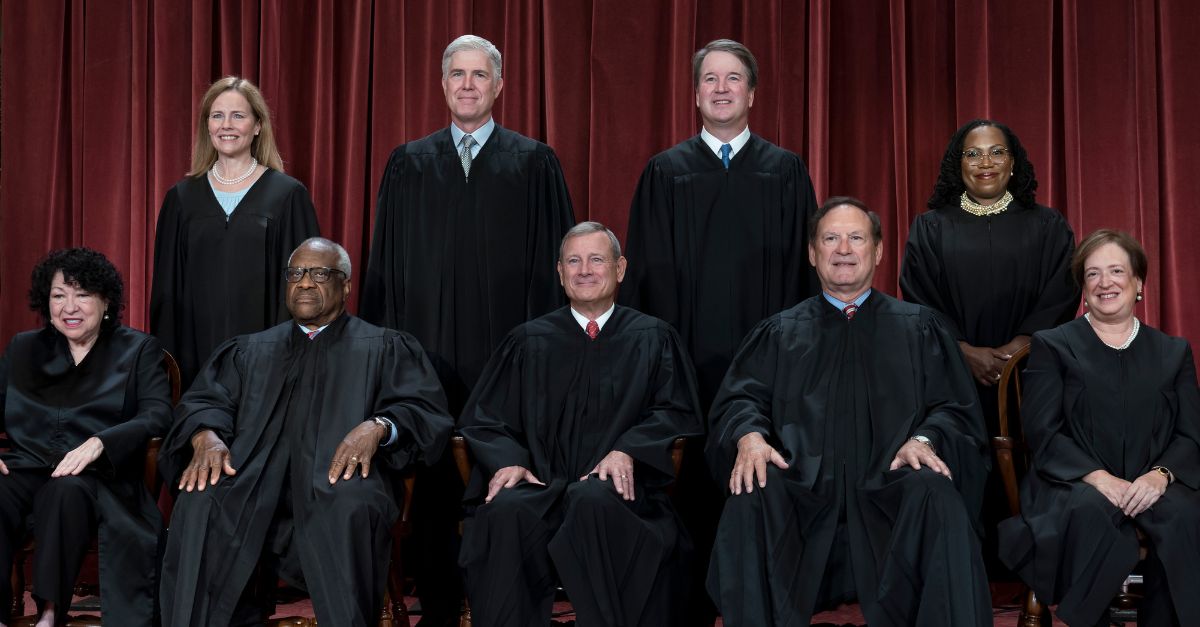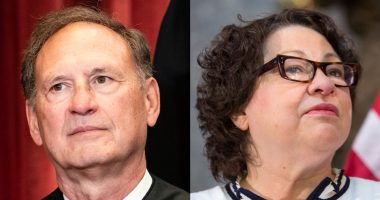
Members of the Supreme Court sit for a new group portrait following the addition of Associate Justice Ketanji Brown Jackson, at the Supreme Court building in Washington, Friday, Oct. 7, 2022. Bottom row, from left, Associate Justice Sonia Sotomayor, Associate Justice Clarence Thomas, Chief Justice of the United States John Roberts, Associate Justice Samuel Alito, and Associate Justice Elena Kagan. Top row, from left, Associate Justice Amy Coney Barrett, Associate Justice Neil Gorsuch, Associate Justice Brett Kavanaugh, and Associate Justice Ketanji Brown Jackson. (AP Photo/J. Scott Applewhite)
Presidential elections carry far more weight than who will be the country’s leader for the next four years. With the highest leadership role in the nation comes the authority to appoint U.S. Supreme Court justices. This decision goes beyond a four-year term. It affects the current voting population, and can also cause irreparable damage to the younger generations regarding various freedoms.
Voting is a fundamental right. Therefore, young people, especially, should feel encouraged and activated to vote this November before their rights — voting and otherwise — are compromised.
Here’s a look at a few lawsuits making their way through the courts that call voting rights into question, and why voting in this year’s election is more important now than ever.
Arkansas and South Carolina gerrymandering challenges
At the beginning of June, the U.S. Supreme Court reinstated a previously dismissed lawsuit challenging Arkansas’s congressional maps. The Supreme Court instructed the federal court to apply the standards it set out for last month’s South Carolina gerrymandering case.
In the South Carolina case, lawmakers were clear about their goals, saying the new maps were designed to increase Republican favor of one of the state’s districts. This was eventually struck down by a three-judge panel of the U.S. District Court as unconstitutional gerrymandering.
However, the Supreme Court reversed the lower court in South Carolina, in a decision led by Justice Samuel Alito, one of the Court’s most conservative justices. He seemingly wants to set a precedent that allows for racial gerrymandering, axing voting rights for African- American voters, and drawing a political line in favor of inequality.
Texas voting restriction and lawsuit
Similarly, the U.S. Supreme Court also denied a petition from Texas voters who asked the justices to take a case that challenges the state’s age-based restrictions on mail-in voting.
Per Texas state law, eligible voters can vote by mail only if they are 65 years or older on Election Day, or if they have a qualifying excuse. Texas voters argue the law violates the 26th Amendment, which prohibits denying the right to vote based on age.
This petition follows on the heels of a federal lawsuit filed in 2020 on behalf of the Texas Democratic Party. Due to the pandemic-related health risks affecting the nation at the time, the plaintiffs in the lawsuit requested Texas lift the age-based limitations. Eventually, the district court dismissed all plaintiff claims.
Voting rights challenged nationwide
Arkansas, South Carolina, and Texas aren’t the only states challenging voter rights. A split Supreme Court ruling in Kansas found voting is not listed as a fundamental right in the state Constitution’s Bill of Rights.
The majority decision was written by the most conservative of the state court’s seven justices, Justice Caleb Stegall, while three justices dissented. The ruling is the result of a 2021 lawsuit for an election law regarding ballot signature verification measures, which states election officials must match signatures on advance mail ballots to the voter’s registration record.
In consideration of whether the measure violates the equal protection rights of voters, four of the court’s seven justices rejected arguments that it violates voting rights under the Kansas Bill of Rights.
Idaho, Oregon, and Mississippi are among other states with active voting lawsuits, all happening less than six months before Election Day.
The ‘case’ for voter fraud
While some politicians want to claim election integrity with the prevention of voter fraud in support of such lawsuits, statistics show voter fraud happens less than 0.0001%.
However, it doesn’t prevent creating stipulations for illegal gerrymandering and other voter restrictions. Could it be that red state politicians are concerned about the uptick in blue voters, especially in and around metropolitan cities, and as a younger generation moves into the voting age?
Rather than be distracted by the fear-mongering narrative of voter fraud, it’s best to look at what the law stipulates and the voting rights granted to eligible voters under the Constitution. When those in charge of federal law set a tone that works against Americans’ rights, it sinks democracy. Those voting in the upcoming presidential election need to understand their ballot holds significance. With the possibility of two new justices being appointed within the next four years, the power this position holds will last longer than any candidate’s tenure as president.
Voters should be aware of who is being targeted in these state lawsuits, the purpose for denying rights to already underrepresented voters, and if they want to give this power to someone who is not willing to uphold the Constitution and single-handedly wants to continue chipping away at equal rights for all.
Kelly Hyman is a TV legal analyst who has appeared on Fox News, CNN, ABC, NBC, CBS, CourtTV, BBC, MSNBC and is the host of the popular true-crime podcast, “Once Upon a Crime in Hollywood.”
This is an opinion piece. The views expressed in this article are those of just the author.
This is an opinion piece. The views expressed in this article are those of just the author.









